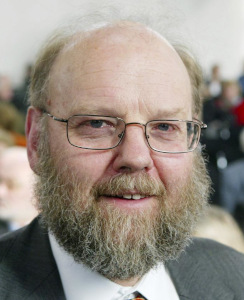Ian Wilmut
Ian Wilmut (7 July 1944 – 11 November 2023) was a British embryologist and Chair of the Scottish Centre for Regenerative Medicine at the University of Edinburgh. He is best known for leading the research group that in 1996 first cloned a mammal, a sheep named Dolly, from adult somatic cells. This groundbreaking achievement sparked a global conversation about the ethics and possibilities of cloning.
Early Life and Education[edit | edit source]
Ian Wilmut was born in Hampton Lucy, Warwickshire, England. He pursued his education in the field of agriculture and animal science, obtaining his Bachelor of Science degree from the University of Nottingham. He later earned his PhD from the University of Cambridge, focusing on animal genetics.
Career[edit | edit source]
Wilmut's early career was marked by his work on the preservation of genetic material and embryo transfer techniques, which laid the groundwork for future advancements in cloning. In the 1980s and 1990s, he worked at the Roslin Institute in Edinburgh, where his research focused on the development of cloning techniques using nuclear transfer methods.
The most notable moment in Wilmut's career came in 1996, when he and his team at the Roslin Institute successfully cloned Dolly the sheep. This was the first time a mammal had been cloned from an adult somatic cell, using a process called somatic cell nuclear transfer (SCNT). Dolly's birth was announced in 1997, causing both excitement and controversy in the scientific community and beyond.
Following the success of cloning Dolly, Wilmut's research interests expanded to include the use of cloning to produce animals with genetic modifications, which could be used for research into human diseases, and the potential for using SCNT techniques for regenerative medicine and therapeutic cloning.
Impact and Legacy[edit | edit source]
Ian Wilmut's work has had a profound impact on the fields of genetics, cloning, and regenerative medicine. The cloning of Dolly the sheep opened up new avenues for research in genetics, leading to advancements in the understanding of how genes can be manipulated and used for therapeutic purposes. It also sparked a global debate on the ethics of cloning, leading to new regulations and policies regarding the use of cloning technology.
Wilmut's contributions to science have been recognized with numerous awards and honors, including being knighted in 2008 for services to science. His work has paved the way for further research in cloning and regenerative medicine, with the potential to develop treatments for a wide range of diseases.
Death[edit | edit source]
Ian Wilmut passed away on 11 November 2023. His death marked the end of an era in the field of cloning and regenerative medicine, but his legacy continues through the ongoing work of scientists around the world inspired by his pioneering research.
See Also[edit | edit source]
Search WikiMD
Ad.Tired of being Overweight? Try W8MD's physician weight loss program.
Semaglutide (Ozempic / Wegovy and Tirzepatide (Mounjaro / Zepbound) available.
Advertise on WikiMD
|
WikiMD's Wellness Encyclopedia |
| Let Food Be Thy Medicine Medicine Thy Food - Hippocrates |
Translate this page: - East Asian
中文,
日本,
한국어,
South Asian
हिन्दी,
தமிழ்,
తెలుగు,
Urdu,
ಕನ್ನಡ,
Southeast Asian
Indonesian,
Vietnamese,
Thai,
မြန်မာဘာသာ,
বাংলা
European
español,
Deutsch,
français,
Greek,
português do Brasil,
polski,
română,
русский,
Nederlands,
norsk,
svenska,
suomi,
Italian
Middle Eastern & African
عربى,
Turkish,
Persian,
Hebrew,
Afrikaans,
isiZulu,
Kiswahili,
Other
Bulgarian,
Hungarian,
Czech,
Swedish,
മലയാളം,
मराठी,
ਪੰਜਾਬੀ,
ગુજરાતી,
Portuguese,
Ukrainian
Medical Disclaimer: WikiMD is not a substitute for professional medical advice. The information on WikiMD is provided as an information resource only, may be incorrect, outdated or misleading, and is not to be used or relied on for any diagnostic or treatment purposes. Please consult your health care provider before making any healthcare decisions or for guidance about a specific medical condition. WikiMD expressly disclaims responsibility, and shall have no liability, for any damages, loss, injury, or liability whatsoever suffered as a result of your reliance on the information contained in this site. By visiting this site you agree to the foregoing terms and conditions, which may from time to time be changed or supplemented by WikiMD. If you do not agree to the foregoing terms and conditions, you should not enter or use this site. See full disclaimer.
Credits:Most images are courtesy of Wikimedia commons, and templates Wikipedia, licensed under CC BY SA or similar.
Contributors: Prab R. Tumpati, MD

